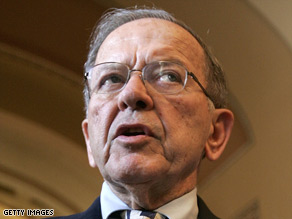Indicted Alaska senator pleads not guilty

Sen. Ted Stevens, R-Alaska, says he is innocent of the charges a grand jury handed up on Tuesday.
The trial will begin with jury selection September 24, Judge Emmet Sullivan announced.
Stevens' lawyer had requested that the trial be held as soon as possible because Stevens is up for re-election in November.
"I want to make a request if at all possible that the trial be in October so that he can clear his name before the general elections," attorney Brendan Sullivan said, adding light-heartedly that it was the first time he had ever asked for a speedy trial.
He also proposed moving the trial to Alaska because a majority of the witnesses are there and the events in question took place there.
The judge, who is not related to Stevens' attorney, said that he thought Washington was an appropriate location for the trial but that he would entertain a motion to move it to Alaska.
Stevens was indicted Tuesday on seven counts of filing false reports on his mandatory Senate financial disclosure forms.
The federal indictment says Veco Energy paid for hundreds of thousands of dollars worth of work on Stevens' home over a period of about seven years, and Stevens failed to report it. It also says that Veco asked Stevens to intervene on its behalf in Washington and that he sometimes did so. Read the full indictment
The government is not offering to let Stevens make a deal, said a Justice Department lawyer prosecuting the case .
"There are no plea offers available at this time," Brenda Morris of the Public Integrity Division said during Stevens' arraignment hearing at the federal district court in Washington.
The government is not accusing Stevens of accepting bribes, said Matt Friedrich, the acting assistant attorney general. He said Tuesday that such a charge "requires proof of a specific quid pro quo," or a specific action in return for a specific payment. "This indictment does not allege that."
But it does accuse Stevens and his staff of receiving requests from Veco for help in Washington and acting on some of them.
If convicted, Stevens could face five years in prison for each of the counts, although he could get a lighter penalty.
Stevens, 84, the longest-serving Republican in Senate history, did not speak during the hearing. His attorney entered the not-guilty plea on his behalf.
Dressed in a light gray suit, Stevens seemed relaxed before the hearing began and smiled after he sat down at the defense table to chat with his legal team.
Two benches in the federal district courthouse were filled by reporters from television, radio and wire services.
The veteran lawmaker had appeared a day earlier for a pretrial interview with court authorities, outfoxing journalists who had expected him to appear Thursday morning.
There apparently were no media present at Wednesday's visit, in contrast to the gaggle of reporters and cameras awaiting Stevens' arrival Thursday at all four court entrances.
"I am innocent of these charges and intend to prove that," Stevens said in a written statement.
The senator has been a lightning rod for critics of pork-barrel spending in recent years.
In 2005, he backed a project to build what was derided as a "bridge to nowhere." The proposal called for construction of a $223 million bridge to connect Alaska's Gravina Island -- population 50 -- to the mainland. Congress later rescinded the earmarked funding for the bridge.
After the indictment was announced Tuesday, Barbara Boxer, D-California, the Senate Select Committee on Ethics chairwoman, and Vice Chairman John Cornyn, R-Texas, issued a statement: "The Senate Ethics Committee does not comment on pending matters or matters that may come before the committee. Absent special circumstances, it has been the longstanding policy of the committee to defer investigation into matters where there is an active and ongoing criminal investigation and proceeding so as not to interfere in that process."
On Wednesday, House Minority Leader John Boehner, R-Ohio, said the "American people have every right to expect the highest ethical standards from every member of Congress. ... The American people deserve better, and I would hope that all members would exhibit the kind of ethics the American people expect."
The indictment against Stevens follows a wide-ranging investigation into ties between Veco Energy and lawmakers in Alaska.
Stevens issued a statement saying he has "never knowingly submitted a false disclosure form required by law as a U.S. senator."
He stepped down from leadership positions on Senate committees after the indictment.
"In accordance with Senate Republican Conference rules, I have temporarily relinquished my vice-chairmanship and ranking positions until I am absolved of these charges," he said.
The government charges that Stevens "knowingly and willfully engaged in a scheme to conceal ... his continuing receipt of hundreds of thousands of dollars' worth of things of value" by failing to report them on his annual financial disclosure forms.
The indictment says home improvements provided by Veco and its chief executive officer, Bill Allen, whom the indictment calls a "personal friend of Stevens," included a first floor, a garage, a first- and second-story wraparound deck, plumbing and wiring.
Allen pleaded guilty in May 2007 to paying out more than $400,000 "in corrupt payments" to Alaska officials, the Department of Justice said in announcing the Stevens indictment. Allen is cooperating with the Department of Justice as part of his plea agreement, Friedrich said. Veco was acquired by another company, CH2M Hill, in September.





